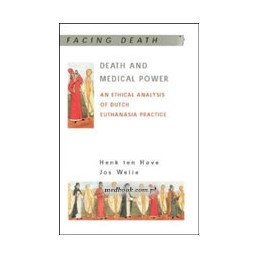- Obniżka


 Dostawa
Dostawa
Wybierz Paczkomat Inpost, Orlen Paczkę, DPD lub Pocztę Polską. Kliknij po więcej szczegółów
 Płatność
Płatność
Zapłać szybkim przelewem, kartą płatniczą lub za pobraniem. Kliknij po więcej szczegółów
 Zwroty
Zwroty
Jeżeli jesteś konsumentem możesz zwrócić towar w ciągu 14 dni. Kliknij po więcej szczegółów
Death and Medical Power details the evolution as well as the complexities of the legal responses to physician involvement in euthanasia. The authors analyze the ethical debate concerning euthanasia, discussing the pros and cons of medical termination of human life. The book concludes with a section on the lessons to be learned from the Dutch experience.
This unique study will be of relevance to all clinicians and other professionals involved in end-of-life care, to health policy makers and educators, as well as anybody else interested in the ethics of euthanasia.
Opis
1. Euthanasia and medical power
The “Postma” Case
The Dutch euthanasia debate
Beginnings of the euthanasia movement
The verdict
Expansion of the debate
The lack of a theoretical foundation for euthanasia
Dutch euthanasia as a contradiction of respect for patient autonomy
Euthanasia as a hindrance to a good death
A framework of queries
2. The growth of medical power
Victims of medical power
Medical-ethical uncertainty
Normative stability
The postwar period
The changing medical scene
Secularization
The power of medicine
A new focus on death and dying
The development of the practice of euthanasia
The issue of public control
Public debate and the politics of compromise
3. The medical practice of euthanasia
Introduction
General description of Dutch euthanasia cases
Incidence of medically procured death (MPD)
Who practices euthanasia?
The doctor-patient relationship
The physicians role in the decision-making process
Evaluation of the practice of euthanasia
Why physicians?
4. The response of the law
Introduction
The relevance of the Dutch legal developments for other countries
The law of 1886
Force Majeure
Jurisprudential developments
Why physicians?
Who can speak on behalf of the medical profession?
Guilty but no punishment
The role of the prosecutor
Legalization of euthanasia
Why a new law?
5. Justifying the euthanasia practice
Introduction
The importance of distinctions
Euthanasia versus letting go
Euthanasia versus palliative treatment
Euthanasia versus PAS
Voluntary versus non-voluntary MDP
Different methods of ethical reasoning
The model of double effect
Patient autonomy
Unbearable suffering and the patient’s quality of life
Shifts in argumentation
6. Lessons to be learned
Introduction
The medicalization of end-of-life care
Medical interventions and control over human death
The inevitability of judgements about patients’ quality of life
Powerlessness of the law, public debate and policy
The importance of distinctions
Towards a broader array of end-of-life care options
Appendix I:: digets of Dutch jurisprudence
Appendix II:: 2001 law on euthanasia and PAS
Notes
References
Index
